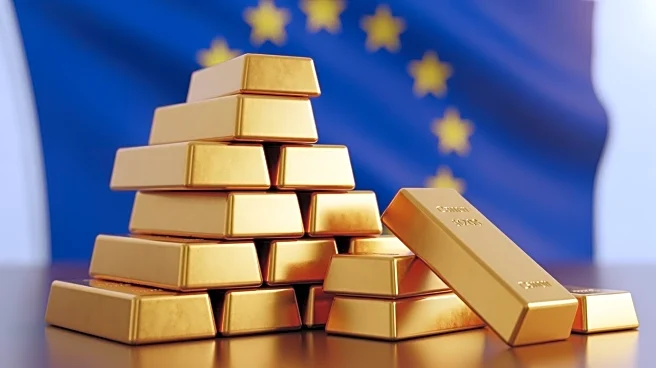What's Happening?
The European Commission has proposed using frozen Russian state assets to provide financial aid to Ukraine, a move that is causing concern among central banks. The plan involves utilizing up to 185 billion euros of Russian assets without confiscating
them, which is controversial among EU countries and the European Central Bank. This proposal comes amid ongoing diversification by countries like China and Poland, which are increasing their gold reserves due to geopolitical risks and sanctions that have frozen Russia's foreign currency reserves. Central banks have been purchasing gold at record levels, with annual net purchases more than doubling since 2022.
Why It's Important?
The EU's proposal could further accelerate the trend of central banks buying gold as a safe haven asset. Gold's appeal lies in its independence from political liabilities and debts, making it attractive for countries concerned about the security of their reserves. The move to use frozen assets highlights the geopolitical tensions and economic uncertainties stemming from the Ukraine conflict. As central banks continue to increase their gold holdings, the price of gold has reached record highs, surpassing the euro as the second-largest reserve asset. This shift could have significant implications for global financial markets and reserve management strategies.
What's Next?
If the EU proceeds with using frozen Russian assets, it is likely that central bank gold purchases will accelerate. Countries may opt to repatriate their gold reserves to ensure security and control over their assets. The geopolitical landscape and economic policies will continue to influence central bank decisions, potentially leading to further diversification away from Western currencies and government debt. The ongoing situation in Ukraine and the EU's actions could prompt other nations to reassess their reserve strategies and increase their reliance on gold.
Beyond the Headlines
The EU's ability to use frozen assets is contingent on their storage outside of Russia, highlighting the importance of asset location in geopolitical conflicts. The trend of repatriating gold reserves reflects a growing desire for autonomy and security in reserve management. The situation underscores the complex interplay between politics, economics, and financial markets, with long-term implications for global reserve strategies and asset allocation.

















